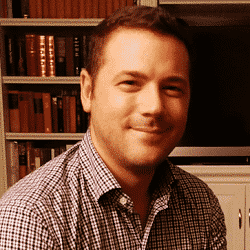When Do We Let Plagiarism Go?
 Recently, Meghan McCain, conservative co-host of The View, married her longtime partner Ben Domenech, a conservative writer who the publisher of the online magazine The Federalist.
Recently, Meghan McCain, conservative co-host of The View, married her longtime partner Ben Domenech, a conservative writer who the publisher of the online magazine The Federalist.
For those writing about it, the story had many different angles. Not only was it a wedding between two well-known conservative pundits, but the wedding had been moved up following the cancer diagnosis of Senator John McCain, Meghan McCain’s father.
However, that wasn’t the approach that the Phoenix New Times, a weekly newspaper out of Phoenix, AZ, took. They ran with a very different headline:
Meghan McCain Marries Conservative Pundit Once Accused of Plagiarism
While the headline is certainly accurate, Domenech’s plagiarism scandal is over ten years old. Though it is one of the things Domenech is best known for, is it really the headline of the story?
While the Phoneix New Times is a more liberal publication and it was clearly taking a shot at Domenech, it was also the only publication to mention the decade-old scandal in its headline.
This raises a serious question: Was the Phoenix New Times right to mention the scandal so prominently or is there a time we should let plagiarism scandals go?
A Recap of the Ben Domenech Plagiarism Scandal
 In March 2006, Ben Domenech was hired by the Washington Post to write fo their new Red America blog, a conservative blog that was part of their fledging online presence.
In March 2006, Ben Domenech was hired by the Washington Post to write fo their new Red America blog, a conservative blog that was part of their fledging online presence.
Domenech, then 24 years old, was already a significant star in conservative punditry at that time. He had co-founded the RedState blog, and his hiring was seen as something of an attempt to bring political balance to a newspaper that generally skews liberal.
However, shortly after the hiring was announced, critics online began overlap between some Domenech’s previous work and other articles. It began with an article he had written for the National Review Online, which used quotes taken from a New York Press article, and went back to his time at William & Mary college, where he wrote for the student newspaper, The Flat Hat.
The allegations quickly grew and several sites began cataloging all of the plagiarism that they had found, tracking dozens of instances over his short career.
Initially, Domenech denied the allegations, saying the plagiarism was the fault of his editors. However, resigned from his Washington Post job after less than one week and, after returning to RedState, offered an apology for the plagiarism.
Though the Washington Post and the National Review Online both conducted investigations into Domenech, they only confirmed previous findings and did not find any new plagiarism issues.
As for Domenech, though he lost out on one of his greatest career opportunities, he went back to being a conservative pundit. He has written for a variety of websites and, in September 2013, founded The Federalist, which he continues to operate and write for today.
Domenech Back in the Spotlight
Though there’s no doubt that Domenech has had a successful career, he hasn’t been in the national spotlight in a similar way since his 2006 scandal. Even a significant portion of his Wikipedia page is dedicated to it.
Still, the scandal is well over a decade old and there have been no similar allegations against Domenech since. With the recent news of his engagement and marriage, is it really part of the headline?
To be clear, most media outlets didn’t mention the plagiarism scandal in their coverage. Only the Phoenix New Times put it in the headline. One gossip site listed it as part of their series of facts on him and a few other sites mentioned it in passing. On the whole, Domenech’s plagiarist past has not been a part of the story.
But this doesn’t mean the story has been forgotten. Political opponents of Domenech still regularly raise the issue, and his past means it may be difficult for him to find work at a major publication (if he ever seeks it out).
Though Domenech has found success, it’s been largely at his own publications, where his past transgressions were already forgiven right after they had happened.
The Shelf Life of Plagiarism Scandals
When it comes to plagiarism scandals, the shelf life of the stories are wildly inconsistent. Some, such as the 2003 Jayson Blair scandal, result in an effective lifetime ban from journalism.
However, two separate ethics scandals, one involving plagiarism in 2014 and one involving inaccurate reporting in 2017, have not been enough to derail the career of Benny Johnson, who was recently hired by The Daily Caller as a reporter.
Meanwhile, Jonah Lehrer, following a 2012 plagiarism and fabrication scandal, has never really rebounded and is still struggling to return to writing.
The aftermath of a scandal has less to do with actual transgressions and more to do with how willing the audience and the publications are willing to forgive them. Journalists can continue working after plagiarism scandals for as long as they can find sympathetic readers and editors.
But this doesn’t answer the question of Ben Domenech. He moved on from his scandal, largely at publications he operates, and has had no allegations of plagiarism over the past decade. When is it time for everyone else to move on?
(Note: After writing this article but before publication, I learned the Domenech was involved in another scandal where he failed to disclose payment he had received to write an opinion piece for The Washington Examiner.)
To me, that answer is complicated. Domenech will, most likely, never fully move on from the scandal. It will always be brought up, especially by his critics, and it may even hamper his career opportunities.
But does it need to be the headline in an article about his marriage? Absolutely not. Yes, it is true that Ben Domench is a plagiarist, but is that what he’s best known for in 2017? Probably not.
While plagiarism scandals shouldn’t be forgotten, they should be put into context. Regardless of how you feel about Domenech’s politics or his past, an article about his marriage is not the place to prominently re-raise a decade-old plagiarism scandal.
It simply comes across as an unfair attack and one that does more harm to the paper than to Domenech.
Bottom Line
Plagiarism scandals can, should and do have consequences, especially for journalists.
However, if we’re not going to make plagiarism a capital offense for a journalism career and we’re not going to simply forget about it, then we need to figure out how to put plagiarism scandals such as Domench’s into context. This is especially imporant considering how much time has passed.
Most outlets did very well finding that context, either by ignoring the plagiarism and putting the focus on his wife or mentioning it only as a footnote. The Phoenix New Times did not.
Domenech will always be known as a plagiarist. But doesn’t have to be the headline every time. There have been many people who plagiarized but don’t have it be what they are known for.
Rightly or wrongly, Domenech will likely be such a case.
Want to Reuse or Republish this Content?
If you want to feature this article in your site, classroom or elsewhere, just let us know! We usually grant permission within 24 hours.
